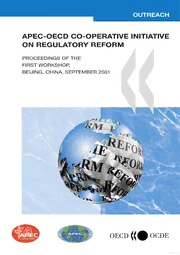Table Of ContentOUTREACH
APEC-OECD CO-OPERATIVE INITIATIVE
ON REGULATORY REFORM
CopyrigMadm
FIRSTWORKSHOPOFTHEAPEC-OECD
CO-OPERATIVEINITIATIVEON
REGULATORYREFORM
I. Preface 3
II. Agenda 4
III. Summaryofdiscussions II
IV. Reportoftherapporteurs IS
V. Summaryofpresentations 25
VI. AppendixI:Fulltextpresentations 53
VII. AppendixII:Listofparticipants 174
1
2
I ProceedingsoetheFirstWorkshopoetheAPEC-OECD
Co-operativeInitiativeonRegulatoryReform
19-20September2001,Beijing,China
eoeofxnmpbeP1orr2dii-ien1enc3cidpeNlsTioenhvsoetfehmtgeoAbo1PeoE9rdEn9Ch2r7ae-0ngR0Ouec0lEpeaoCitnroDCtrBoyrmtCupoponer-MetaioiicnpttieDiisrcaotaernesturisasavsnneaoddlnaIcnmRoRi.enetcgigTeauutphllitaeavstet.oAorgroTyyrnheeRReReemceffeogoonurmrtlmmma.boteoInattrnywawdegaeRestnenheedftnaohdOeriomEstrwdsCproeDridovovearptnigraditbnenhyiscesiatpAahtlePieofsEAnoCsProunEsMemCitrnseif1ogso9uutrtle9ra9etitxhaodeclrehycsMalteanrrregueactefttioiunrorogmenf
andorganisationoftheco-operativeframework,withtheaimtosupporttheimplementationofasimilarsetof
principlesonregulatoryreformintherespectivemembercountries.
Atthelaunchingconference,heldinSingaporeon22—23February2001,aseriesofthreeworkshops
wereagreeduponandthegovernmentsofChina,MexicoandKoreaagreedtohostoneofthem.Animportant
decisionoftheconferencewastoensurewidedisseminationoftheworkoftheCo-operativeInitiativethrough
publishingtheproceedingsoftheworkshopsandestablishingawebpage.
SeptemberTh20e0F1irsitnWBoerikjisnhgo.pDoefputhteyASPeEcrCe-taOrEyCGDenCeor-aolpeSraaltliyveShIenilttioanti-vCeoolbnyRefgruolmattohreyOReEfCoDrmawnadsVhiecledoMnin1i9s-t2e0r
ZhenyuSunfromtheChineseForeignTradeandEconomicCo-operationMinistryopenedtheWorkshop.
Representativesfromover25countries,business,labour,andseveralinternationalorganisations,includingtheWorld
BankandtheEuropeanCommission,discussedthetopicsof(1)Thedesignandoperationofabroadandsustainable
regulatoryreformprogrammethatproducesconcreteresultsforconsumersandbusinessesand(2)Theimportanceof
buildingcompetitionprinciplesintoregulatoryregimes.Thesuccessoftheworkshop,toalargeextent,wasdueto
themeticulousplanningofandstrongsupportfromtheChinesesponsors.
Thisreportprovidesacomprehensiveaccountofthepresentationsanddiscussionsattheworkshop.Itis
organisedalongtheagendaofthemeeting,andincludesthetwostatementsoftherapporteurs,thoseofMr.Luigi
CarboneandMr.FredericJenny.Thepresentationsarereproducedinfulllengthintheappendixofthepublication.
Thereportwillbemadeavailabletotheparticipantsofthemeeting,tointerestedexpertsandtothepublicatlargein
ordertoraiseawarenessfortheRegulatoryReformagendaglobally.
TheSecondWorkshop,whichwilltakeplaceinApril2002,hostedbytheGovernmentofMexico,is
goingtoconcentrateon(1)BuildingInstitutionsforaSuccessfulRegulatoryImpactAssessmentProgrammeand(2)
IntegratingMarketOpennessintoRegulatorySystems.
A-i-ur
RolfAlter MargaritaTrillo
HeadofPrograOmEmeCDonRegulatoryReform ConvHeenaodrooffTtehcehAniPcEalCCCooomppeertaittiioonnaPnodliIcnytearnnadtDioenraelguRlealtaitioonnGsroup
3
II. AGENDAOFTHEBEIJINGWORKSHOP
8:45-9:30
Registration
9:30-10:30
Welcomeandopeningremarks
- ZhenyuSun,ViceMinister,MinistryofForeignTradeandEconomicCooperation,China
- SallyShelton-Colby,DeputySecretary-General,OECD
- MargaritaTrillo,ConvenoroftheCompetitionPolicyandDeregulationGroup,APECand
PleadofInternationalRelationsandTechnicalCooperation,INDECOPI(NationalInstitute
fortheDefenseofCompetitionandProtectionofIntellectualProperty),Peru.Ms.Trillowill
reviewsomeoftheimportantmessagesfromtheopeningconferenceinSingaporein
February2001.
• 10:30-18:00
Session1: Designingandsustainingabroadregulatoryreformprogramme
- Chair:RolfAlter,PleadofProgrammeonRegulatoryReformOECD.
- Rapporteur:LuigiCarbone,ChairoftheOECDWorkingPartyonRegulatory
ManagementandReform,and,fortheItaliangovernment.CounsellorofStateandDeputy
DirectoroftheRegulatorySimplificationUnit.
Economiesfacebasictasksinreformingtheirregulatorysystems:establishingcapacitiesto
promotereform,initiatingchangeandco-ordinatingcross-cuttingissues;reformtheprocessesfor
developingnewregulationstoensurethatregulationisusedonlywhennecessaryandthatthe
continuingstreamofneededregulationsmeethighqualitystandards;andupgradethequalityof
theenormousinventoriesofmlesandformalitiesthathavesurvivedwithoutseriousexamination
foryearsorevendecades.Thissessionwillbedividedintothreepanelsthatwillexaminehow
economieshaveaddressedbasictasks,including;
- Implementinggoodregulationprinciplestospeedupresults.Awell-organisedand
monitoredreformprocess,drivenby“enginesofreform”withaccountabilityforresults,is
importantforthesuccessoftheregulatoryreformpolicy.
- Communicatingwithaffectedinterests.
- Simplifyingbusinessregulationstoreduceformalitiesandredtapeinhibitingbusinessstart-
ups,marketentry,andgrowth.
4
10:30-12:30
Panel1:Implementinggoodregulationprinciples
Frameworkprinciplescanprovideguidancetoreformers,buttheimplementationstrategyand
driversofreformareoftentooweaktoovercomevestedinterestsandcreategenuinechangein
theregulatorybodies.Skilfulpoliticalleadershipanddedicateddriversofreforminside
governments are neededto promote andco-ordinate reformprogrammes. Toimprove
implementation,manygovernmentshaveestablishedcentralregulatoryco-ordinationand
managementcapacitiesandinstitutions.Thesebodiescarryoutacontinuingreformprogramme
thathelpsnationalregulatoryregimesadjustmorequickly.Thispaneladdressestheinstitutions
andmechanismsestablishedbygovernmentstoimplementpoliciesofregulatoryreform.
Amongtheinvitedspeakersare:
- PhongthepThepkajana,Minister,MinistryofJustice,Thailand
- LingLi,Inspector,DepartmentofTreatyandLaw,MOFTEC,China
- AkiraKawamoto, Director,ElectricityMarketDivision,ElectricityandGasIndustry
Department,AgencyforNaturalResourcesandEnergy,MinistryofEconomy,Tradeand
Industry,Japan
- NguyenDinhCung,DirectorofMacroEconomicPolicyDepartment,CIEM,Vietnam
12:30-13:30
Lunchandvisitstodocumenttables
13:30-15:30
Panel2:Communicatingwithaffectedinterests
Taprpalniscpaatrioennscyheilspkteoyctuoreremgaunlaytoorfytqhuealrietya.soInsmpfroorvreedgutlraatnosrpyarfaeinlcuyreisn—rceagputluarteoraynddecbiiassiotnsowaanrdd
concentratedbenefits,inadequateinformationinthepublicsector,rigidity,marketuncertainty
vainrdtuionuasbilciirtcylet—oucnodnesrusmtearndsptorulsitcycormipske,tiatnidonlamcokroefbaecccaouunsteabsipleictiya.lTirntaenrsepstasrehnacvyehleelspsspcorweeartetoa
mtohraegnaiwnpaiuzrlaaattgieaoingnsostv(ecNroGnrOmmsep)tnit—onah.nadsAmnpauritknecatrseh.aisgTehreianrnstvhpaealrauecenticovynitiysgooavflsecorivncimloensnsoitcdieterrteaynd—stpsoaurbceehnctayhs.enNsohena-rwgpoeisvntefrosnrwmmoearntdtiaoilnn
capacitiesarepermittingtheestablishmentofcentraliseddatabaseswithsearchengines,
electronicfiling,andinstitutionalre-engineeringthroughone-stopshops.
Amongtheinvitedspeakersare:
5
- DohoonKim,SeniorResearchFellow,KoreaInstituteforIndustrialEconomicsandTrade
- MariaTeresaFabregasFernandez,EnterpriseDirectorate-General,UnitG/1Legislative,
EuropeanCommission
- RoyJones,SeniorPolicyAdvisor,OECDTradeUnionAdvisoryCommittee
15:30-16:00
Coffeeandvisittodocumenttables
16:00-17:45
Panel3:Simplifyingbusinessregulations
Fewregulatoryreformsaremorepopularthanpromisestosimplifygovernmentredtape.Oneof
themostcommoncomplaintsfrombusinessesandcitizensisthecomplexityandnumberof
governmentformalitiesandpaperwork.Governmentformalities,so-called“redtape,”are
importanttoolsusedbygovernmentstocarryoutpublicpoliciesinmanypolicyareas,including
safety,health,andenvironmentalprotection.However,iftheyarepoorlydesignedorapplied,
inefficient,oroutdated,theycanimpedeinnovation,entry,investment,andcreateunnecessary
barrierstotrade,investment,andeconomicefficiency.Often,proceduresareusedasanti-
competitivemeasuresgiving‘insiders’protectioninsomemarkets,orasavenuesforcorruption.
Redtapeisalsodisproportionatelycostlierforsmallerbusinessesthanforlargerbusinesses.The
resultisthatnationaleconomiesarelessabletogrow,compete,adjust,andcreatejobs.Reducing
redtapeandgovernmentformalitiescanproducesubstantialpayoffs.Thispanelwillexamine
strategiesforsimplifyingbusinessregulations.
Amongthespeakerswillbe:
- DarrellPorter,SeniorOfficer,OfficeofRegulatoryReview,Australia
- DoafntiheelBuJ.siBnreosdsy,anMdaInnadgusitnrgyDAidrveicstoorr,yUCoSmmIinftotremeattiootnheTeOcEhnCoDlogyOfficeandrepresentative
- AdelardoC.Abies,Economist,DepartmentofFinanceandJoyAbrenica,Professor,
UniversityofthePhilippinesDiliman,Philippines
- CesarCordova-Novion, DeputyHeadofProgrammeonRegulatoryReform,OECD
Secretariat,Paris
17:45-18:00
- TrevorBull,ConvenorofAPECPrivatisationForum,OfficeofStateEnterprise&
GovernmentSecurities,MinistryofFinance,Thailand
- SummarybytheRapporteur
6
20September2001
9:30-17:00
Session2:ImprovingtheCompetitionPolicyFoundationforRegulatoryReform
Chair:MargaritaTrillo,ConvenoroftheCompetitionPolicyandDeregulationGroup,APEC
andHeadofInternationalRelationsandTechnicalCo-operation,INDECOPI(NationalInstitute
fortheDefenseofCompetitionandProtectionofIntellectualProperty),Peru.
Rapporteur:FredericJenny,ViceChairoftheOECDCompetition,LawandPolicyCommittee,
Conseildelaconcurrence(FrenchCompetitionAuthority).
TheAPECPrinciplestoEnhanceCompetitionandRegulatoryReformandtheOECDprinciples
ofregulatoryreformplacethestrengtheningofmarketsatthecentreofsustainablegrowth.For
bothgroupsofeconomies,regulatoryreformandenhancedcompetitionwereimportanttoolsas
partofalargerrecoverystrategy.BoththeOECDandAPECprinciplesrecognisetheimportance
ofparallelreformsincompetitionpolicy,marketopenness,publicsectorperformance,and
corporategovernance.
Thissessionwillexaminetheintegrationofcompetitionpolicyintothegeneralpolicyframework
forregulation.Competitionpolicyiscentraltoregulatoryreform,becauseitsprinciplesand
analysisprovideabenchmarkforassessingthequalityofeconomicandsocialregulations,as
wellasmotivatetheapplicationofthelawsthatprotectcompetition.Moreover,asregulatory
rpreefvoernmtstpirmiuvlaatteesmasrtkmcetturaalbuscehsangfer,omvigroervoeurssinegnfotrhceembeennetfiotfscoomfperteiftoiromn.pAoliccyomipslneemeednetdttoo
competitionenforcementiscompetitionadvocacy,thepromotionofcompetitive,market
principlesinpolicyandregulatoryprocesses.Itisdividedintothreepanels:
- Integratingcompetitionprinciplesintoregulatoryreformprogrammesthroughcompetition
advocacyandadvice.
- Pro-competitionrestructuringofpublicutilitiestocreatecompetitivemarketsofformer
governmentmonopoliesandtoregulateresidualnaturalmonopolyelementswithaccess
regimes.
- Creatingeffectiveregulatorsforpublicutilities,includingtherelationshipbetweenthe
competitionauthorityandsectoralregulators.
7
Panel1:Integratingcompetitionprinciplesintoregulatoryreformprogrammes
Competitionauthoritiescanbevaluablealliesinregulatoryreform.Throughgeneraladvocacy
andenforcementactions,theycanattractattentiontoproblemscreatedbypoorregulation.When
reformsareimplemented,theycanuseenforcementandpublicitytoensurethattheobjectivesof
reformareachieved.Tobeeffective,competitionauthoritiesmustdevelopcapacitiesfor
advocacyinsidegovernments,beabletointervenewheremorecompetitionwouldbenefit
consumers,andeffectivelyenforcethelaw.Adequateresourcesarenecessaryiftheyaretobe
effective.Thispaneladdresseshowcompetitionauthoritiescandevelopaneffectiveadvocacy
rolewithinthepublicadministration.
Amongtheinvitedspeakersare:
- AudreyTsyganov,DeputyMinister,MinistryforAntimonopolyPolicyandSupportof
Entrepreneurship,RussianFederation
- XinHiiaWei,DeputyDirector,DepartmentofPolicies,Laws,andRegulations,State
EconomicandTradeCommission,China
- RoryMcLeod,Manager,CompetitionPolicy,CompetitionandEnterpriseBranch,Ministry
ofEconomicDevelopment,NewZealand
- ArmandoCdceres,ChiefoftheSectoralReformCo-ordinationProgram,Ministryof
EconomicsandFinanceandformerConvenoroftheCompetitionPolicyandDeregulation
Group(CPDG),Peru.
11:15-11:30
Coffeeandvisitstodocumenttables
11:30-13:15
Panel2:Pro-competitionrestructuringofpublicutilities
Liberalisationofpublicutilitiessuchastransport,energy,andcommunicationscanproduce
imnannovyatibeonne,fiatsn,dilnocwleurdipnrgicecsostforefcfoicniseunmcey,rsbeatntderusseerrsv.icAe,pgrroebatleermpisrotdhuacttthvearifueltly,beennefhiatnsceodf
liberalisationmaynotbeachievedorenjoyedbyconsumersiftheincumbentcontrolsa
bottleneckintheproductionprocess,suchastheelectricitygridorgasstoragefacilitiesorif
thereareregulatoryinconsistenciesofthedifferentlevelsofthesectorthatcauseregulatory
failure.Decisionscriticaltohowthemarketwilldeveloparemadeveryearlyintheliberalization
process,whenthegovernmentdecidesonhowtorestructuretheincumbentfirmanddecidethe
regulatoryframework.Ifthegovernmentbreaksuptheincumbentfirmandmandatesownership
separationamongessentialfacilitiesandnetworks,competitionwillemergemorequicklyand
withlessregulatoryoversight.Ifaverticallyintegratedmonopolyisleftintact,manyyearsof
heavyhandedanddifficultregulatoryoversightwillbeneededtodefendmarketentry.
Regulationisnotasubstituteforgettingthestructurerightfromtheverybeginning.Regulationis
alsosubjecttopotentialfailure.Thispanelwillexaminetheimportanceofrestructuringpublic
utilitiestomaximisethebenefitsofmarketliberalisation.

